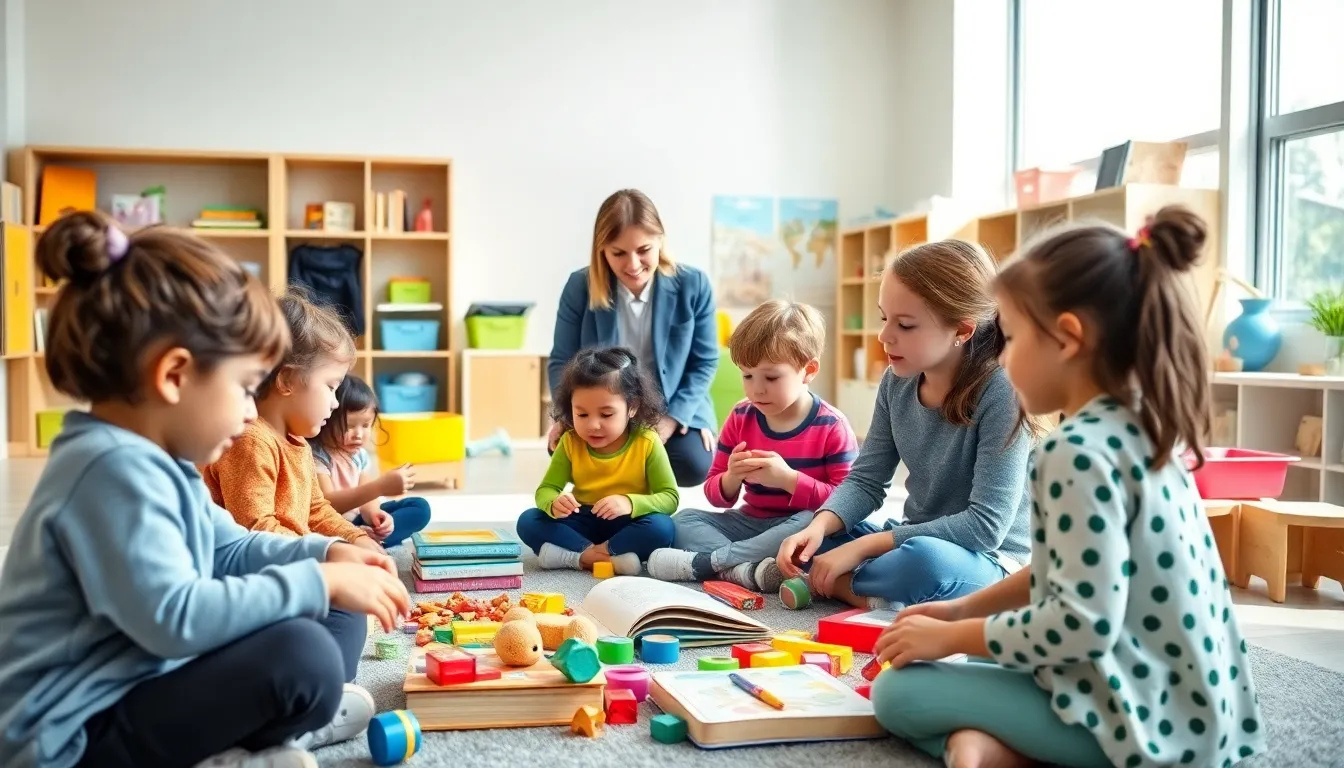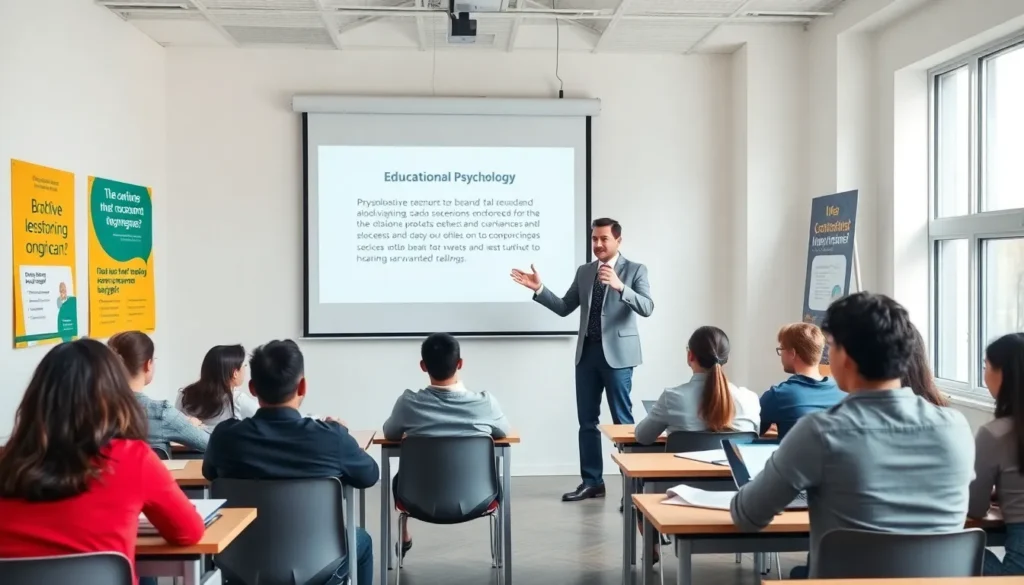Table of Contents
ToggleImagine walking into a classroom filled with eager minds, ready to absorb knowledge like sponges. But wait, why does one student shine while another seems stuck in the shadows? This is where educational psychology steps in, like a superhero wearing glasses instead of a cape. This field dives deep into understanding how people learn and how teachers can elevate that process. In this text, we’ll explore the intriguing realm of educational psychology, clarify its definition, and unveil its significance in shaping effective teaching methods. So sit back, relax, and prepare to unravel the mysteries of learning.
Historical Background of Educational Psychology

Educational psychology didn’t just spring up overnight: it has roots that trace back to ancient philosophers. Think Socrates, Plato, and Aristotle, who laid the foundational ideas about learning and knowledge. Fast forward to the 19th century, when a neuroscience revolution ignited interest in understanding the mind. Enter educational pioneers like John Dewey and Jean Piaget, whose theories on development and experiential learning took the education world by storm. Dewey believed education should be grounded in real-world experience, while Piaget focused on cognitive development, how students construct knowledge through their own experiences. These key figures helped pave the way for educational psychology as we know it today.
But wait, educational psychology isn’t just historical musings. The 20th century saw an explosion in research and theory, with contributions from behaviorists like B.F. Skinner, who emphasized the power of reinforcement in learning, to cognitive psychologists like Jerome Bruner, who explored problem-solving and discovery learning. These theories not only shaped educational practices but also fostered a movement toward a more student-centered approach in education.
Key Theories in Educational Psychology
Several key theories have significantly influenced educational psychology, each contributing unique insights into how learning occurs.
Behaviorism
Behaviorism focuses on observable behaviors rather than internal processes. Think of it as a reward system: students learn through reinforcement. Remember when someone praised you for a job well done? That’s behaviorism in action. B.F. Skinner’s work highlights how positive reinforcement can boost learning outcomes.
Cognitivism
Cognitivism, in contrast, digs into the mental processes behind learning. Emphasizing understanding over memorization, this theory showcases the importance of mental models and schemas. Cognitive theorists argue that effective learning happens when students can connect new information to their prior knowledge.
Constructivism
Then there’s constructivism, which suggests that learners actively construct their understanding of the world. Think of it as building blocks, each experience adds a layer to a student’s knowledge base. Jean Piaget and Lev Vygotsky championed this theory, highlighting the importance of social interactions and cultural context in shaping learning.
Humanism
Finally, humanism in educational psychology centers around the emotional aspects of learning. It posits that self-actualization is key. When students feel respected and valued, they’re more likely to engage and succeed in their educational endeavors. Maslow’s hierarchy of needs emphasizes that higher-level needs, like esteem and belonging, must be met for effective learning to occur.
Principles of Educational Psychology
Several principles guide the practice of educational psychology, providing frameworks for understanding learning processes.
Individual Differences
Every learner is unique, and educational psychology recognizes these individual differences. It’s not a one-size-fits-all approach: rather, it encourages tailored strategies that cater to diverse learning styles and needs.
Motivation
Motivation is a driving force in education. Understanding intrinsic and extrinsic motivators helps educators design interventions that inspire enthusiasm and engagement among students.
Active Learning
Active learning emphasizes the importance of student participation. Rather than sitting back and listening, students benefit from engaging with the material through discussions, projects, and hands-on activities. This principle is rooted in the belief that involvement boosts retention and understanding.
Feedback
Feedback plays a crucial role in learning. Constructive, timely feedback helps students recognize their strengths and areas for improvement, fostering growth and development. Educational psychologists stress the significance of a positive feedback loop in the learning cycle.
Importance of Educational Psychology in Teaching
Educational psychology isn’t just a set of theories: it’s a vital part of effective teaching. The insights it provides are essential for:
- Fostering Positive Learning Environments: Understanding students’ psychological and emotional needs allows teachers to cultivate classrooms where students feel safe and motivated.
- Enhancing Instructional Strategies: Educators can incorporate various learning theories and principles to develop instructional techniques that resonate with students, making learning more impactful.
- Promoting Lifelong Learning: By instilling a love for learning and critical thinking skills, educational psychology prepares students to thrive beyond the classroom.
- Identifying Learning Challenges: Psychologists can help recognize learning disabilities or social-emotional challenges, enabling schools to provide necessary support and interventions.
In a nutshell, by leveraging educational psychology, teachers can become more effective and responsive, eventually enhancing student success.
Applications of Educational Psychology in the Classroom
The principles and theories of educational psychology translate into practical applications within the classroom setting. Here are some impactful ways:
Differentiated Instruction
By applying the principles of individual differences, teachers can tailor their instruction to meet the diverse abilities within their classrooms. This could involve varied teaching methods or materials to engage all students effectively.
Formative Assessment
Regular formative assessments allow teachers to gauge understanding and provide timely feedback. This practice aligns with the principle of feedback, helping students adjust and improve their learning paths.
Collaborative Learning
Encouraging collaboration among students taps into the constructivist approach. Group work enables students to learn from peers, fostering social interaction and enhancing the educational experience.
Self-Regulation Strategies
Teaching students self-regulation techniques instills ownership of their learning. By helping them set goals, monitor progress, and adjust strategies, educators empower learners to navigate their educational journey.
Challenges and Future Directions in Educational Psychology
Like any evolving field, educational psychology faces challenges. One major hurdle is the reliance on standardized testing, which can often overlook individual nuances in learning. Balancing academic rigor with diverse teaching strategies remains a continuous challenge for educators.
Another significant challenge lies in integrating technology effectively in the classroom. While tools can enhance learning experiences, it’s crucial to ensure that they don’t replace personalized teaching. The future of educational psychology might involve bridging these gaps, focusing on inclusive practices that recognize all Students’ needs.
Also, the ongoing research into mental health awareness among students is vital. Understanding how emotional well-being influences learning can shape better educational policies and practices.







